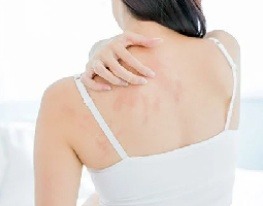About Us


Adult onset Atopic Dermatitis, also known as Adult onset Eczema, is an uncommon variety of eczema, which shows its first manifestation in adulthood.
Adult Atopic Dermatitis
Atopic Dermatitis or Eczema is a common chronic itchy skin condition in children, which causes itchy red scaly areas around the face and body folds. It generally improves spontaneously before the child enters adolescence. Rarely, they persist into adulthood. Adult onset Atopic Dermatitis, also known as Adult onset Eczema, is an uncommon variety of eczema, which shows its first manifestation in adulthood. It usually occurs in people who have an ‘atopic tendency’, that is to say, it is common among individuals who have eczema, asthma and/or hay fever among other family members, say a parent, child or sibling. It is also common among ‘atopic personalities’. Atopic personalities have above-average intelligence, are sensitive and introverted, have a lot of nervous energy and tend to harbor a lot of repressed emotions. They may have difficult relationships with their parents.
Atopic dermatitis is NOT contagious and does NOT reflect your personal hygiene. It arises because you have an underlying ‘atopic tendency’, and it gets flared up when that is complicated by stress or environmental triggers like winters, excessive sweating or woolens. Other irritants include dust, mites, pollen, animal furs, molds, insects and/or food and food additives. Chemicals like detergent, solvents and pesticides can aggravate the eczema on your hands. Metals like nickel and cobalt can lead to eczema in areas like the wrist (from wrist-watches), the ear and neck (from jewelry) and areas in contact with metallic buttons and hooks.
This kind of eczema occurs as a result of a complex interaction of genetic and environmental factors playing out together. Your dermatologist will ask you to undergo an allergy patch test and a blood test, to determine the specific allergens which are aggravating your eczema. Avoiding the ‘culprit’ allergen will result in a definite improvement.
Diy Tips
- Avoid and protect from triggering factors.
- Avoid excessive bathing, wiping and prolonged contact with soap or detergent. Use the soap prescribed by your dermatologist.
- Keep your skin adequately moisturized at all times. Use mild fragrance free moisturizers. Moisturize your skin 3 to 4 times a day.
- Avoid strong perfumes, food with artificial colors and flavors, woolen and silk clothing, and keep the house free from dust and pollen.
- Atopics are slightly more prone to bacterial and viral skin infections, which must be attended to immediately.
Your doctor will treat your eczema with antihistamines (to relieve itching) and medicated creams and moisturizers. When the eczema is involving large areas of your skin, you may be treated with oral medications or light therapy. The active lesions can be treated completely. The real challenge is to maintain the remission.
Adult Eczema tends to wax and wane for some years, before it settles of its own accord. Eczema tends to flare up during winters or during periods of physical and psychological stress. Simple DIY measures can help in keeping your eczema under remission for prolonged periods.
